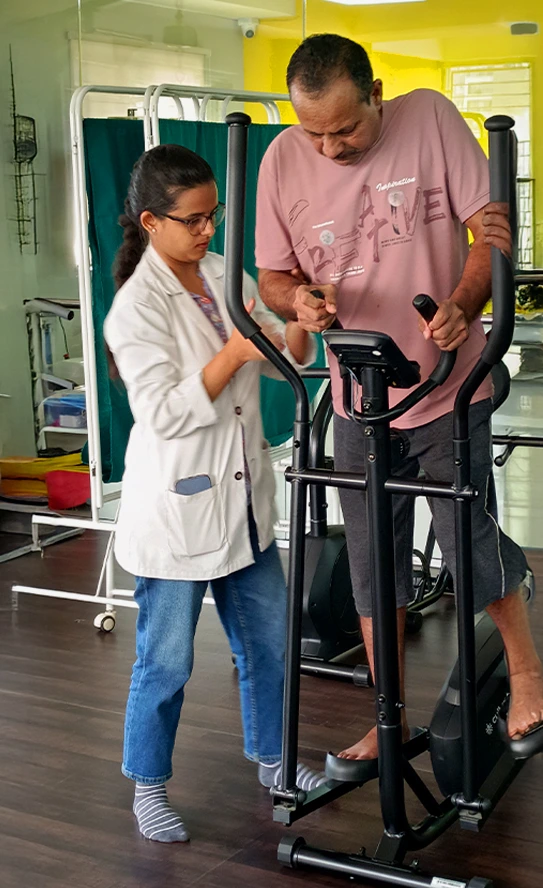Specialized Care for Brain Injury Recovery in Pune


Rebuilding Skills, Restoring Function, and Reclaiming Life
A traumatic brain injury (TBI) is a life-altering event that impacts the very control center of an individual's personality, memory, and physical abilities. Unlike other injuries, the path to recovery is complex and unique, often involving challenges that are "invisible" to the outside world. For families, navigating these cognitive and behavioral changes can be the most difficult part of the journey.
At Apricot Care in Pune, we specialize in comprehensive brain injury rehabilitation. We understand that a TBI affects the whole person and the entire family. Our mission is to provide a highly structured, expert-led, and deeply compassionate program that addresses every facet of recovery, helping survivors reclaim their highest possible level of independence.
Key Components of Your Brain Injury Recovery
A complete TBI recovery plan requires a highly integrated, neuropsychological approach. Our multidisciplinary program includes:
- Cognitive Rehabilitation: To address challenges with memory, attention, and problem-solving.
- Behavioral Management & Support: To manage impulsivity, agitation, and emotional changes.
- Physical & Mobility Therapy: To rebuild strength, balance, and coordination.
- Functional Occupational Therapy (ADLs): To restore independence in daily life tasks.
- Speech & Cognitive-Communication Therapy: To improve clarity of thought and expression.
- Psychological & Family Counseling: To provide essential support for both the survivor and caregivers.
- Community Re-integration Programs: To practice real-world skills in a safe environment.
- Vocational Rehabilitation: To explore pathways back to work or school.
Understanding Traumatic Brain Injury (TBI)
A TBI is typically caused by an external force, like a fall or an accident, that causes the brain to move inside the skull. This can result in diffuse (widespread) damage, which is why the effects are often more complex and variable than those of a stroke. With over 1.5 million TBIs occurring in India each year, primarily from road accidents, the need for specialized care is immense.
The most significant challenges often lie beyond the physical injuries:
- Cognitive Deficits: Difficulties with memory (amnesia), attention, concentration, and executive functions (the brain's ability to plan, organize, and problem-solve).
- Behavioral Changes: This can include impulsivity, irritability, agitation, emotional lability (uncontrolled emotional displays), and a lack of insight into one's own difficulties (anosognosia).
Our program is specifically designed to address these complex cognitive and behavioral issues with expert care.
The Goal of TBI Rehabilitation: Maximizing Independence
The primary goal of our brain injury program is to help individuals progress to the highest level of independence and functional quality of life possible. This involves relearning lost skills, developing new compensatory strategies, and successfully reintegrating into family and community life.
Request a Call Back to Discuss a Recovery Plan3 Simple Steps to Begin Your Recovery
- BOOK APPOINTMENT: Schedule a comprehensive assessment with our TBI specialists.
- VISIT OUR PUNE FACILITY: Meet our team and see our structured, low-stimulation therapeutic environment.
- BEGIN YOUR PERSONALIZED PROGRAM: Start your intensive, one-on-one therapy program designed around the survivor's specific cognitive and physical needs.
Benefits of Our Specialized TBI Care Program
- Improved Cognitive Function: Our targeted therapies help improve memory, attention, and problem-solving skills for daily life.
- Better Behavioral Management: We provide consistent strategies to help manage challenging behaviors, reducing stress for the entire family.
- Increased Physical Independence: Rebuild strength, balance, and coordination for safer mobility.
- Enhanced Safety: By addressing issues like impulsivity and impaired judgment, we help create a safer environment for the survivor.
- Reduced Caregiver Burden: Our intensive family education and training empowers caregivers, giving them the tools and support they need.
- A Clear Path Forward: We provide a structured roadmap for recovery that helps reduce the confusion and uncertainty families often feel.

our service
Our Comprehensive Care and Support Services
24/7 Nursing and Medical Supervision
At apricot Care, we provide 24/7 nursing support to ensure that you receive continuous care and medical monitoring. Whether you're staying in our facility or recovering at home, our trained nurses and medical staff are always available to address your needs, ensuring a safe and secure environment throughout your recovery journey.
Why Choose Apricot Care For Brain Injury Care in Pune?
Expertise in Cognitive & Behavioral Rehab
This is our specialty. We have the expert team, including rehabilitation psychologists and occupational therapists, required to effectively manage the "invisible" injuries of TBI.
A Highly Structured, Low-Stimulus Environment
Our facility is intentionally designed to be calm, quiet, and organized. This is essential for patients who are easily overstimulated, agitated, or have attention deficits.
Intensive Family & Caregiver Education
We believe the family is a co-therapist. We provide more education and hands-on training for families than any other program, empowering you to be a confident and effective part of the recovery process.
A Truly Integrated, Multidisciplinary Team
Your entire team meets formally and regularly to discuss the case, ensuring cognitive, behavioral, and physical goals are perfectly aligned at all times.
Focus on Community Re-integration
Our ultimate goal is to help the survivor reintegrate into family, social, and vocational life.
.webp)
.webp)
 (1).webp)
.webp)
.webp)
.webp)
.webp)
.webp)
.webp)
.webp)
.webp)
.webp)
.webp)
.webp)
.webp)

